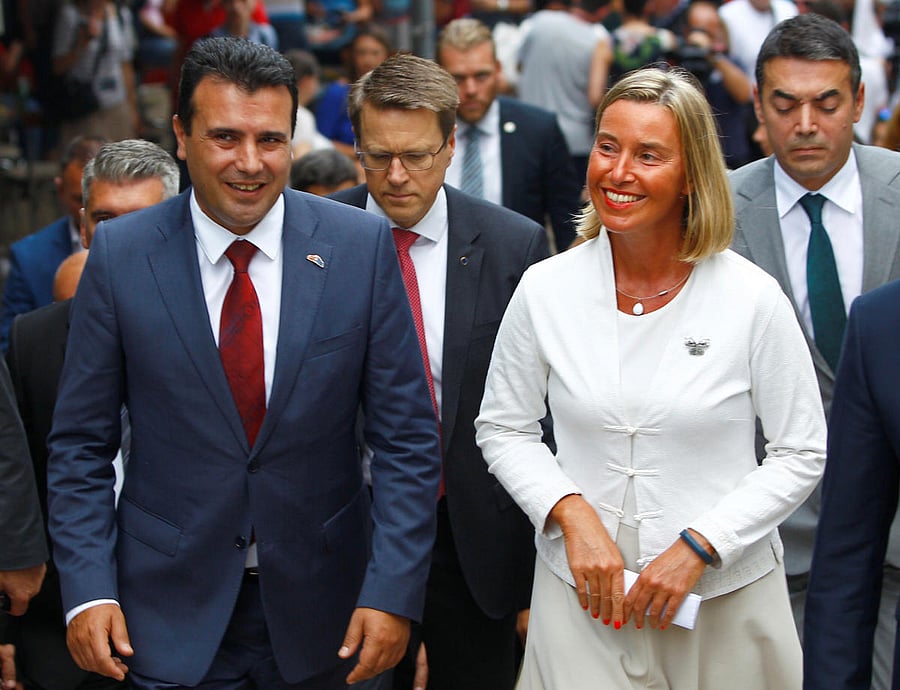
Macedonians must choose between a new name or a future of isolation and instability, Prime Minister Zoran Zaev told AFP ahead of a September 30 referendum on the issue.
The proposed change, which would rename the country the Republic of North Macedonia, is Zaev's effort to end a 27-year-old dispute with Greece and usher his Balkan nation into NATO and the European Union.
Long seen as one of Europe's most stubborn deadlocks, the name row is a tussle over history, identity and land.
Athens has blocked the former Yugoslav republic from joining NATO and the EU since 1991 because it considers the country's name an encroachment on its own province called Macedonia.
Greeks also accuse Skopje of appropriating their history and culture, notably by erecting huge monuments to Alexander the Great, the king of ancient Macedon.
But there was a breakthrough between Zaev and Greek counterpart Alexis Tsipras in July -- a rare detente in a region tangled in complex disagreements.
Zaev must now convince the country of 2.1 million people to accept the new name despite a widespread feeling that they have been bullied by Greece.
A pro-Europe politician who helped topple a nationalistic government, Zaev has framed the name-change as a painful but historic opportunity for Macedonia to link arms with the West.
If the deal unravels, it will mean "hopelessness, total isolation of the country, probably another chapter of insecurity and instability in the whole region", the 43-year-old told AFP after a campaign speech in the western city of Kicevo.
Alternatively, a 'yes' vote could make the accord a model for other regional disputes, said Zaev, an economist who has sought to revamp Macedonia's foreign relations since coming to power more than one year ago.
"Other types of identity problems can be solved through deals like this," he said.
Zaev and his Social Democrats party must tread lightly to avoid inflaming nationalists who feel they are being robbed of their identity.
He has avoided uttering the new name during townhall-style debates around the country.
"North" is also nowhere to be seen on government billboards that encourage the public to "Go vote for a European Macedonia".
The referendum question itself asks: "Are you for EU and NATO membership by accepting the agreement between the Republic of Macedonia and the Republic of Greece?"
Zaev is trying to reach the majority of Macedonians -- 80 percent, he says -- who want to join those Western institutions.
But critics have chafed at what they perceive to be a misleading question.
And while NATO membership is all but assured, the road to the EU will be longer for a country still mired in corruption.
The appetite for EU enlargement is also shrinking among some members of the bloc, who voted to push Macedonia's accession talks back to June 2019 despite the hard-won deal.
EU officials and leaders like Angela Merkel have nevertheless been passing through Skopje almost daily to whip up support.
The Russians, meanwhile, "told me that they have nothing against Macedonia's accession to the EU but that they are opposed to NATO integration", said Zaev.
A July survey conducted by the US-funded Center for Insights in Survey Research found 57 percent supported the accord.
"I am so strongly convinced that the referendum will succeed that I'm not even looking into other options," Zaev told AFP.
The right-wing opposition, VMRO-DPMNE, has stopped short of advocating a boycott, urging the public instead to act "according to their conscience".
Civic groups have taken up the torch however, with the hashtag #boycott rippling across social media.
Zaev said detractors are using "disinformation as a tool" to defeat the proposal.
The biggest challenge may be generating sufficient turnout in a country where even supporters are only grudgingly in favour of the deal.
"I don't think it's a fair deal, but I will vote for it," said Sasho Ilioski, 45, because he wanted a chance to join the EU.
"There is a certain amount of disappointment here, that people will lose a part of their identity, their national pride. They will still vote for this deal, but these feelings cannot be hidden."